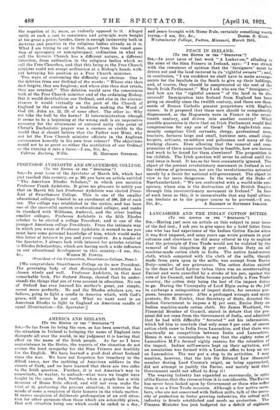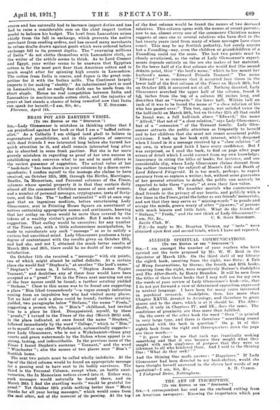LANCASHIRE AND THE INDIAN COTTON DUTIES. (To THE Enrroa OP
THE " SPECTATOR.") Sill,—Having just seen an article on this subject in your issue of the 2nd inst., I ask you to give space for a brief letter from one who has had experience of the Indian Cotton Excise since it was first imposed, and some years ago wrote protests in your columns and elsewhere (as did many others) to try to explain that the principle of Free Trade would not be violated by the removal of the iniquitous 34 per cent. Excise Duty on •all machine-made cotton cloth in India. The native hand-woven cloth, which competed with the cloth of the mills, though made from yarn spun in the mills, was exempt from Excise Duty—another of our grievances. The cotton duties existed in the days of Lord Lytton (when there was no countervailing Excise) and were cancelled by a stroke of his nen, against the vote of his Council, and India became practically a Free Trade country, the cotton duty being the last of the import duties to go. During the Viceroyalty of Lord Elgin owing to the fell in exchange a reimposition of import duties, for revenue pur- poses, became necessary. After a prolonged wrangle and many protests, Sir H. Fowler, then Secretary of State, directed the Indian Government to impose a 34 per cent. Excise Duty on Indian machine-made cotton cloth. Sir James Westland, the Financial Member of Council, stated in debate that the pro- posal did not come from the Government of India, and admitted that he had with difficulty " ferreted " out his information, which led him to conclude that only some 9 per cent. of coarse cotton cloth came to India from Lancashire, and that there was practically no competition between India and Lancashire. Hence it was a commonplace to say that the eighty votes of Lancashire M.P.s formed eighty reasons for the retention of the impost. Indian mill-owners kept up their agitation, and an association was formed with a London office to keep an eye on Lancashire. The war put a stop to its activities. I may mention, however, that the late Sir Edward Law (financial member during Lord Curzon's; reign), on being approached, did not attempt to justify the Excise, and 'merely said that Government could not afford to drop it! The weaving industry has expanded so enormously, in spite of the Excise,that the revenue-from it is considerable. TheExcise has never been looked upon by Government or those who suffer from it as a Free Trade measure. Although a few native mem- bers, who are not concerned with Indian mills, talk of the neces- sity of protection to foster, growing industries, the cotton' mill industry is firmly established and needs no protection. The Finance Minister has just budgeted for' a deficit of eighteen
crores and has naturally had to increase import duties and has had to raise a considerable sum on the chief import (cotton goods) to balance his budget. The howl from Lancashire arises chiefly from the fall in exchange, which prevents the native merchant from sending orders, and has caused many merchants to refuse drafts drawn against goods which were ordered before exchange fell to its present depths. The " swarming millions of India " do not clothe themselves with Lancashire cloth, as the writer of the article seems to think. As to Lord Cromer and Egypt, your writer seems to be unaware that Egyptian cotton ie for the most part finer than American cotton and is much sought after for spinning high counts in Lancashire. The cotton from India is coarse, and Japan is the great com- petitor for it with the Indian mills. The Continent largely imports it for making " shoddy." An infinitesimal part is used in Lancashire, and no really fine cloth can be made from its short staple. Hence no real competition between India and Lancashire in machine-made cotton cloth, and the injustice of years at last stands a chance of being remedied now that India can speak for herself.—I am, Sir, &c., T. E. Srascass. Florence, April 7th.



































 Previous page
Previous page